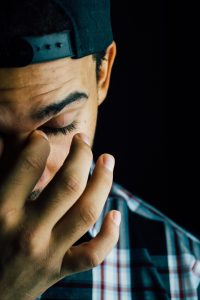Anxious, Irritable and Overwhelmed: How to Survive Benzo Withdrawal
Benzodiazepines, popularly known as benzos, are among the most frequently prescribed drugs in the US. Though they can be useful in treating a long list of conditions including anxiety and insomnia, these medications can be powerfully addictive – and stopping them can trigger withdrawal symptoms that range from the uncomfortable to the life threatening. But with professional support and good self-care, you can survive the anxiety, irritability and other symptoms that come with benzo withdrawal.
Why Are Benzos So Addictive?
Withdrawal from benzo addiction causes symptoms that can last from a few days to months or even years. Although individual effects vary, as a group the benzos depress the central nervous system and act on receptors in the brain related to pleasure and mood. This class of drugs includes:

Anxiety and irritability are common benzo withdrawal symptoms.
- Xanax (alprazolam)
- Ativan (lorazepam)
- Klonopin (clonazepam)
- Valium (diazepam)
- Dalmanil (flurazepam)
- Restoril (temazepam)
These drugs cause changes in the brain’s pathways, so that when a user stops taking the medication, the body responds to the absence of the drug with symptoms that can include:
- Anxiety
- Sleep problems
- Irritability and other mood changes
- Tremors
- Sweating
- Problems with concentration and memory
- Panic attacks
- Suicidal thoughts
People who have taken high doses of benzos for very long periods, or who use them along with other drugs or alcohol, may have even more severe withdrawal symptoms, including seizures and palpitations.
When Does Withdrawal End?
Not everyone who stops using benzodiazepines will go through withdrawal. But someone who abuses them with high doses or long term use will probably experience at least some withdrawal symptoms. Early withdrawal symptoms can begin as soon as 24 hours after taking the last dose. This stage of withdrawal typically lasts between 1 and 4 days. During this time, “rebound” anxiety can set in as the drug begins to leave your system. You might also feel irritable and have trouble sleeping.
The second stage of withdrawal, called acute withdrawal, generally lasts around two weeks. During this time, anxiety and the other physical and emotional symptoms of withdrawal can become severe. After withdrawal ends, though, anxiety and other symptoms can persist, sometimes for months or even years – a condition called Protracted, or Post-Acute Withdrawal Symdrome. And for many people who were originally prescribed benzos to stop anxiety, that same anxiety returns.
Surviving Benzo Withdrawal
Many benzo users try to stop, only to start taking the drug again once they begin to experience withdrawal symptoms. That’s why it’s best to have the support of professionals who can help you get through the withdrawal period and take actions if symptoms become hard to manage.
Though there isn’t a medication to make benzo withdrawal easier, in some cases rehab programs might provide a different, longer acting benzo to make the process smoother. Counseling and peer groups can help you cope with the physical and mental symptoms of benzo withdrawal and remind you that your symptoms are normal.
Along with professional support, it’s essential to practice good self-care. Important ways to take care of your mind and body during benzo withdrawal include:
- Keeping a stable routine of waking and going to bed
- Eating a high quality, nutritious diet
- Exercise
- Meditation
- Writing down your feelings in a journal
If you’re addicted to benzodiazepines, quitting benzos can be emotionally and physically overwhelming. But the right support and a commitment to caring for your health can get you on the way to recovery.
Are you overusing benzodiazepines – but afraid to stop? We’re ready to help. Contact us at 888-602-1971(Who Answers?) for the answers you need right now.





